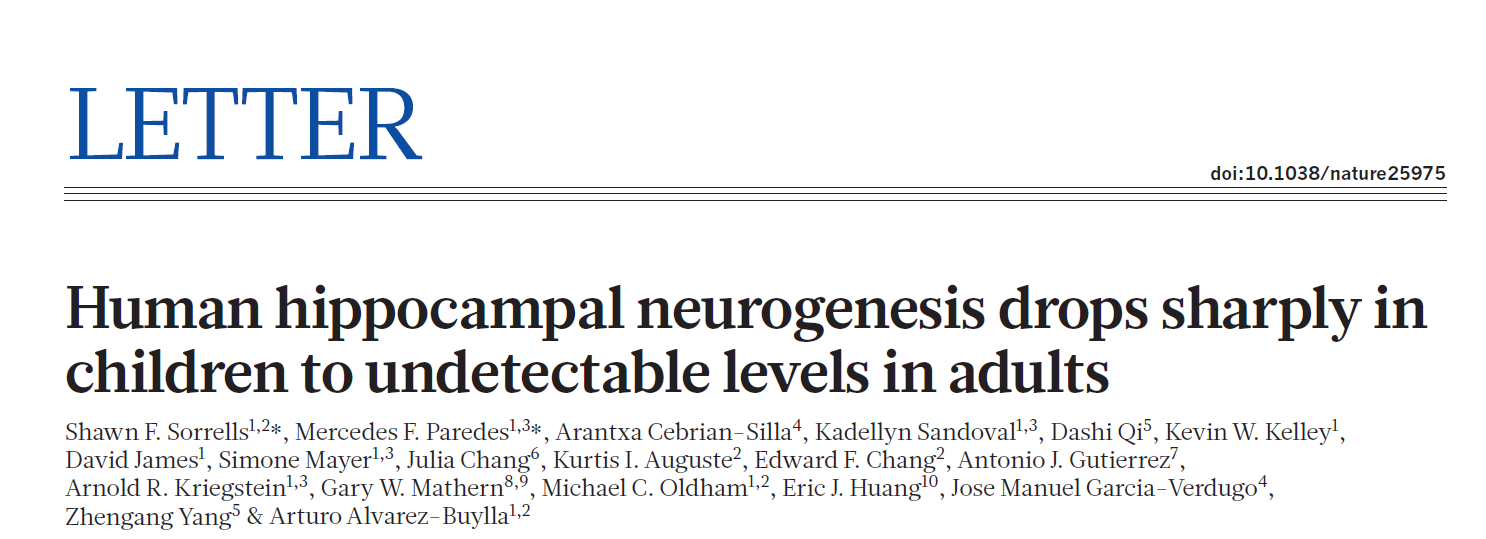Introduction: For a long time, scientists believe that every day, the human brain's hippocampus will produce hundreds of new nerve cells. However, one of the latest results published in Nature may have to subvert this idea. The new study found that once we were adults, neurons in the area seemed to stop producing.

Resource:Nature(DOI:10.1038/nature25975)
Once this new result was published, it sparked intense discussion because in the past 20 years, some studies have led scientists to believe that although human and animal hippocampus (brain regions involved in learning and memory) produce neurons, As the age increases, it decreases, but even in the oldest individuals, there will be some new neurons.
According to the review of Science magazine, in 1988, scientists obtained the first evidence of the presence of neurogenesis in adults. The cancer patients in this study received bromodeoxyuridine injections while alive. This chemical will mark new dividing cells. Studies have confirmed that bromodeoxyuridine appears in a small amount of hippocampal neurons in the brain tissue of these deceased patients.
Later, in 2013, the Jonas Frisén laboratory of the Karolinska Institute published a new result that supported the above conclusions. According to the study, from a cellular age point of view, humans will replace 700 neurons per day in the dentate gyrus (part of the hippocampus).
However, the discovery of Frisén et al., Arturo Alvarez-Buylla of the University of California, San Francisco, has always been skeptical. A few years ago, his team investigated a well-preserved adult brain sample and found some young neurons in multiple brain regions other than the hippocampus. Based on this, they decided to carry out a larger-scale analysis to further verify the findings.
Key findings
In this newly published study, the team analyzed brain hippocampal tissue from 59 donors (from fetus to 60-70 year old). They use fluorescent antibodies to mark specific proteins on cells of different maturities; at the same time, they use electron microscopy to look for the typical, slender, simple shape of young neurons.
It was found that humans have a large number of neural stem cells and progenitor cells in the early stages of life. At birth, there are 1,618 young neurons per square millimeter of brain tissue. However, between 1 and 7 years old, the generation of new neurons was reduced by a factor of 23; in adulthood, the supply of young neurons completely disappeared. Researchers can still observe that some of the "oldest samples" of immature nerve cells come from a 13-year-old donor.
It should be emphasized that this study included analysis of the hippocampus of 22 patients with epilepsy. The brain parts of these patients were removed and immediately processed for analysis. In these cases, the researchers did not find any young hippocampal neurons in the population over 11 years of age.

Young neurons (green) are shown in the human hippocampus at the ages of (from left) birth, 13 years old and 35 years old. Images by Arturo Alvarez-Buylla lab
Alvarez-Buylla et al. concluded that only young neurons exist in fetuses and children. The number of newborn neurons in the hippocampus begins to decrease after birth and declines to nearly zero in adulthood.
Debates
Interestingly, Frisén also questioned this new achievement of Alvarez-Buylla. He believes that the use of antibody markers in this study is not reliable, because background fluorescence will affect the results of the study, and other teams using the same technology have observed adult neurogenesis.
And neuroscientist Gerd Kempermann also said whether these marker molecules can reliably mark young neurons, depending to a large extent on the quality of the sample tissue. Not seeing new neurons does not mean that they are not there. “On the other hand, chemicals used to preserve and stabilize tissue samples may further prevent the marker molecules from binding to their target cells. Under these conditions, it is difficult for these markers to function.” Amsterdam Paul Lucassen of the University added.
In addition, some neuroscientists also warn that the physical and mental status of those donors is also important. How much exercise do they have? Is it bedridden? Is it frustrated by the disease? These problems are related because factors such as exercise, stress, and disease can affect the number of newborn hippocampal neurons.

Nerve cells (red) in the hippocampus.Credit: Thomas Deerinck, NCMIR/SPL
Concerns
In addition to questioning, the results also brought great concern. Ludwig Aigner of the University of Paracelsus Medical University in Austria said: "If confirmed, this discovery is not only a "big hit" for scientists in the field, but also for people with certain brain diseases. Because researchers have been hoping to use the brain's ability to generate new neurons to treat neurodegenerative diseases such as Alzheimer's disease and Parkinson's disease."
However, Sandrine Thuret of King's College, London, said that on the positive side, this study may have some direct positive effects on the field, for example, encouraging other researchers to seek out young neurons in the adult hippocampus, or this prompted researchers to develop better marker molecules to track the formation of neurons in living bodies.
Souce: NovoPro 2018-03-13
